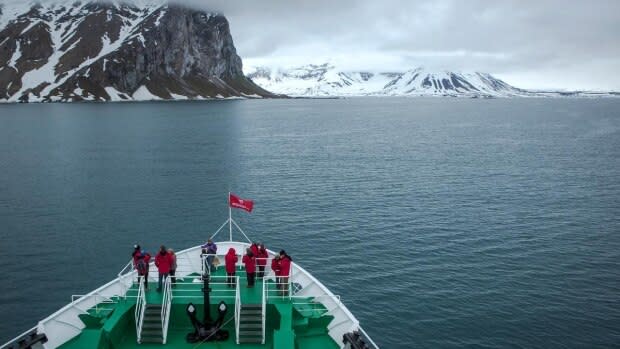Environmentalists hope self-imposed ban on heavy fuel oil will get regulators talking
In the midst of international steps to ban the cheapest and dirtiest go-to fuel in Arctic seas, one industry group has gone ahead with a self-imposed ban — a move some hope will put pressure on regulators and industry to get off the fuel more quickly.
The 30-member Association of Arctic Expedition Cruise Operators announced on Nov. 7 that members would no longer be allowed to use heavy fuel oil on their ships.
Heavy fuel oil is a byproduct of crude oil. It produces more pollutants than diesel, but it's also cheaper — as much as half the cost of cleaner alternatives. It's been banned in the Antarctic by international law since 2011.
G Adventures, an expedition cruise company that offers Arctic tours around Svalbard and Greenland, voted in favour of the ban. Expedition operations manager Susan Adie says it's a way to take a stand against "one of the worst pollutants there is."
Adie says it is already standard practice for her company and others in the association to refrain from using heavy fuel oil, but it would be "wonderful" if this sends a signal to larger ships that it's time to change.
"None of the port towns want these emissions," she said. "So the pressure is on the shipping industry to step up to the plate and make the change."
The association's self-imposed ban comes as the International Maritime Organization is in discussions about an international Arctic ban on carrying or using the fuel.
The organization's sub-committee on pollution prevention and response is expected to discuss the issue in February, and environmentalists believe a ban will likely be approved.
That's why Andrew Dumbrille, Arctic shipping specialist at WWF Canada, hopes the decision will put new pressure on Canadian regulators and shipping companies to start thinking about how to get off the fuel.
"We need a plan in place to manage that transition," Dumbrille said. "And I think it's up to federal regulators to lead us on that."

In 2018, the federal government said a ban on the use of heavy fuel oil in Arctic seas required further study. In June this year, Transport Canada held a public consultation on it, and told CBC it's committed to a "comprehensive assessment" of how a ban would affect the Arctic.
Dumbrille said discussion about heavy fuel oils also loomed large at the Canadian Marine Environment Advisory Council's semiannual meetings, which wrapped up last week.
In that meeting and others, Dumbrille said, the shipping industry said that higher fuel costs will mean pricier shipping — and that could affect the price of goods.
"For sure ... any increase in cost is an issue for our customer," said Daniel Coté with Groupe Desgagnés, which operates ships that resupply Northern communities.
Coté told CBC on Friday that the International Marine Organization has already set limits on the sulphur content from ships globally. Those come into effect this January — and that means companies are already planning to use less heavy fuel oil.
"Of course, if the government wants to go in that direction, we will comply," he said.
Dumbrille believes it remains to be seen if the industry just absorbs the costs, but either way, if the federal government doesn't make a decision on heavy fuel oil in the Arctic, international law may make it for them.
"Industry is going to have to find a way to manage the increased cost," said Dumbrille. "The other solution here is for the federal government or other governments to step in to manage that transition, whether it's a transition fund or some other incentive program."

Until then, some are glad that ships are taking their own steps to be more green. Verner Wilson III is senior oceans campaigner for Friends of the Earth, United States. His family is from Bristol Bay, Alaska, and fishing is a big part of their lifestyle. He says he's "thankful" cruise operators are stepping away from the fuel.
"Heavy fuel oil poses a significant risk of both spills, but also of pollution and black carbon emissions and to both the atmosphere and on sea ice and the marine ocean," said Wilson. "We hope other shipping companies follow the example… and not use heavy fuel oil in the Arctic."


